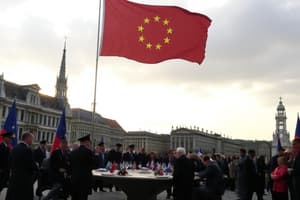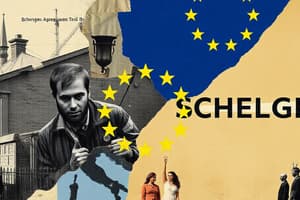Podcast
Questions and Answers
Which concept best describes the European Union as a unique political entity that defies traditional categorization?
Which concept best describes the European Union as a unique political entity that defies traditional categorization?
- Sui generis (correct)
- Federalism
- Confederation
- Intergovernmentalism
According to Alan Milward, how has the EU redefined the concept of sovereignty?
According to Alan Milward, how has the EU redefined the concept of sovereignty?
- By centralizing all power in Brussels.
- By diminishing the power of nation-states.
- By sharing and enhancing it among member states through integration (correct)
- By establishing a rigid hierarchy of authority.
What was the primary goal behind the formation of the European Union?
What was the primary goal behind the formation of the European Union?
- To make it practically impossible to start a war among European nations. (correct)
- To create a military alliance against external threats.
- To establish a single European state.
- To dominate global trade and commerce.
How did the Maastricht Treaty contribute to the constructivist idea of the EU?
How did the Maastricht Treaty contribute to the constructivist idea of the EU?
According to Benedict Anderson's concept of 'Imagined Community', what does it highlight about the EU?
According to Benedict Anderson's concept of 'Imagined Community', what does it highlight about the EU?
Which of the following best describes the relationship between the EU and its member states, according to Paul Taylor?
Which of the following best describes the relationship between the EU and its member states, according to Paul Taylor?
What is a primary characteristic of intergovernmentalism within the context of EU integration?
What is a primary characteristic of intergovernmentalism within the context of EU integration?
Why did European nation states, according to the text, form a symbiotic relationship within the EU?
Why did European nation states, according to the text, form a symbiotic relationship within the EU?
What factor often leads to the failure of treaties with strong federalist characteristics (EC/EU) during ratification?
What factor often leads to the failure of treaties with strong federalist characteristics (EC/EU) during ratification?
According to Stanley Hoffmann, in which areas should member states retain core sovereignty under intergovernmentalism?
According to Stanley Hoffmann, in which areas should member states retain core sovereignty under intergovernmentalism?
According to Liberal Intergovernmentalism, why do states choose to cooperate and delegate authority to international bodies like the EU?
According to Liberal Intergovernmentalism, why do states choose to cooperate and delegate authority to international bodies like the EU?
Which of the following best describes the concept of 'spillover' as it relates to Neo-functionalism?
Which of the following best describes the concept of 'spillover' as it relates to Neo-functionalism?
How does Neo-functionalism explain the shift of political debate from national capitals to Brussels?
How does Neo-functionalism explain the shift of political debate from national capitals to Brussels?
What is the key difference between Functionalism and Neo-functionalism in the context of European integration theories?
What is the key difference between Functionalism and Neo-functionalism in the context of European integration theories?
Which concept explains the initial public support for European integration, which later turned into skepticism?
Which concept explains the initial public support for European integration, which later turned into skepticism?
What is the role of Euro-bureaucrats/technocrats in the Neo-functionalist view of European integration?
What is the role of Euro-bureaucrats/technocrats in the Neo-functionalist view of European integration?
How does Liberal Intergovernmentalism explain the creation of the Single Market?
How does Liberal Intergovernmentalism explain the creation of the Single Market?
Which of the following is a prediction of Neo-functionalism regarding the effects of economic integration?
Which of the following is a prediction of Neo-functionalism regarding the effects of economic integration?
According to Liberal Intergovernmentalism, what is the primary factor driving states to integrate more deeply?
According to Liberal Intergovernmentalism, what is the primary factor driving states to integrate more deeply?
What is one way Euro-bureaucrats stimulate further integration, according to the Neofunctionalist perspective?
What is one way Euro-bureaucrats stimulate further integration, according to the Neofunctionalist perspective?
Flashcards
EU as Sui Generis
EU as Sui Generis
A unique political entity, not easily categorized.
EU-Member State Symbiosis
EU-Member State Symbiosis
Cooperation where the EU and member states mutually benefit.
EU as 'Imagined Community'
EU as 'Imagined Community'
The idea that the EU, like nations, is a socially constructed identity.
EU Redefining Sovereignty
EU Redefining Sovereignty
Signup and view all the flashcards
Maastricht Treaty (1992)
Maastricht Treaty (1992)
Signup and view all the flashcards
Federalism (in EU context)
Federalism (in EU context)
Signup and view all the flashcards
Delegation of Tasks in EU
Delegation of Tasks in EU
Signup and view all the flashcards
Intergovernmentalism
Intergovernmentalism
Signup and view all the flashcards
Integration in Practice
Integration in Practice
Signup and view all the flashcards
EU Strengthens Global Presence
EU Strengthens Global Presence
Signup and view all the flashcards
Cooperation & Delegation
Cooperation & Delegation
Signup and view all the flashcards
Liberal Intergovernmentalism
Liberal Intergovernmentalism
Signup and view all the flashcards
Functionalism
Functionalism
Signup and view all the flashcards
Spillover Effect
Spillover Effect
Signup and view all the flashcards
Elite Socialization
Elite Socialization
Signup and view all the flashcards
Shift to Brussels
Shift to Brussels
Signup and view all the flashcards
Permissive to Constraining Dissensus
Permissive to Constraining Dissensus
Signup and view all the flashcards
Neo-functionalism Predictions
Neo-functionalism Predictions
Signup and view all the flashcards
Constructivist View
Constructivist View
Signup and view all the flashcards
Jean Monnet & the EU
Jean Monnet & the EU
Signup and view all the flashcards
Study Notes
- The EU is a distinct political system described as an Unidentified Political Object (UPO), or sui generis, meaning unique in itself.
Key Questions
- What concepts help us categorize our knowledge about the EU?
- Is there solidarity among European nation-states, and should it be studied?
- How is power shared among political institutions in a multi-level system?
- The EU's goal is to make war practically impossible and is a center of global power.
Relationship Between the EU and Member States
- The EU draws from historical forms of governance like confederations, nation-states, empires, and colonies, while remaining unique.
- Statehood (Gellner): Modernity shaped nation-states and the EU builds upon and diverges from these forms.
- Imagined Community (Anderson): The EU is a construct representing collective identity beyond physical borders, similar to nations.
- Symbiosis vs. Rivalry (Taylor): The EU exists in cooperation with member states, with mutual benefit, influenced by historical governance forms like confederations and empires.
- Sovereignty (Milward): The EU redefines sovereignty as shared and enhanced by integration, blending historical models with modern realities, contrasting the centralized power seen in historical governance.
- 1992: Maastricht Treaty marked the formal start of the EU, establishing symbols like the flag and reinforcing the constructivist idea of shared symbols fostering identity and unity.
- European nation-states, whose economies were too small to compete globally, formed a symbiotic relationship within the EU to strengthen global presence and the EU can only exist if the states that formed it want it to exist.
Characteristics That Shaped the EU
-
Federalism advocates for a supra-state "United States of Europe" to replace national states and overcome nationalism, though strong federalist characteristics in treaties often fail ratification due to national resistance.
-
Intergovernmentalism: States power/ core sovereignty should remain intact, especially in high political and nationally sensitive areas like army and currency issues.
-
Integration in practice: States delegate tasks to Brussels if it serves national interests or when it is better organized in Brussels or to avoid the political cost in national politics, specifically painful decisions.
-
States only cooperate and delegate when it benefits them, especially avoiding sensitive issues like military or money.
-
Liberal Intergovernmentalism, Andrew Moravcsik's theory 'preferences of power,' emphasizes: Formation of national preferences and intergovernmental bargaining.
-
Determining what national interests to defend and promote intergovernmentally. Delegation of authority to EU institutions through interstate agreements.
-
The Single Market demonstrates how economic integration was negotiated to balance national and collective interests.
-
Economic benefits and strategic negotiations lead states to integrate more deeply while still safeguarding their key national interests.
-
Functionalism (Mitrany): Promotes functional non-political, technocratic integration to make war impossible.
-
Applied by Jean Monnet: The EC's formation is based on this technocratic logic.
-
Neo-functionalism (Haas): Builds on functionalism with: Gradual Integration (Spillover): Integration in one necessitates cooperation in others.
-
Ever closer union: ECSC → EEC → Single Market → Euro (Deepening)
-
Elite Socialization/ loyalty transfer: (Euro-)bureaucrats and technocrats create joined values and loyalties.
-
Shift of political debate from national capitals to Brussels, which would give rise to Formation of supranational interest groups, such as Greenpeace & Amnesty.
-
Permissive Consensus to Constraining Dissensus: Initially, public support enabled elites to drive integration, now public skepticism of the elite and Brussel limits further integration.
-
Economic integration benefits all member states leading to economies of scale.
-
It leads to political integration via elite socialization & loyalty shifts, emergence of supranational interest groups and step-by-step gradual integration (spillover).
-
Europeanization, a Constructivist view states that norms, values & interests evolve under specific conditions.
-
EU policy-making occurs through uploading and downloading:
-
Uploading (policy-shaping): Member states shape EU rules based on their preferences ("goodness of fit").
-
Downloading (policy-taking): EU rules reshape domestic politics, empowering specific groups and creating a "Brusselisation" effect.
-
De-Europeanisation: Reversal of EU norms, as seen in democratic backsliding. De-coupling from EU or EU norms after having acquired them.
-
Multi-level Governance: Governance approaches to study the EU in a 'third way' manner separate from international and domestic politics, but as a sui generis entity.
-
The EU operates as a unique governance system involving actors at multiple levels namely: EU level, Nation state level, and Local level.
-
Subsidiarity principles: Decisions should be made at the level closest to citizens.
Studying That Suits You
Use AI to generate personalized quizzes and flashcards to suit your learning preferences.




